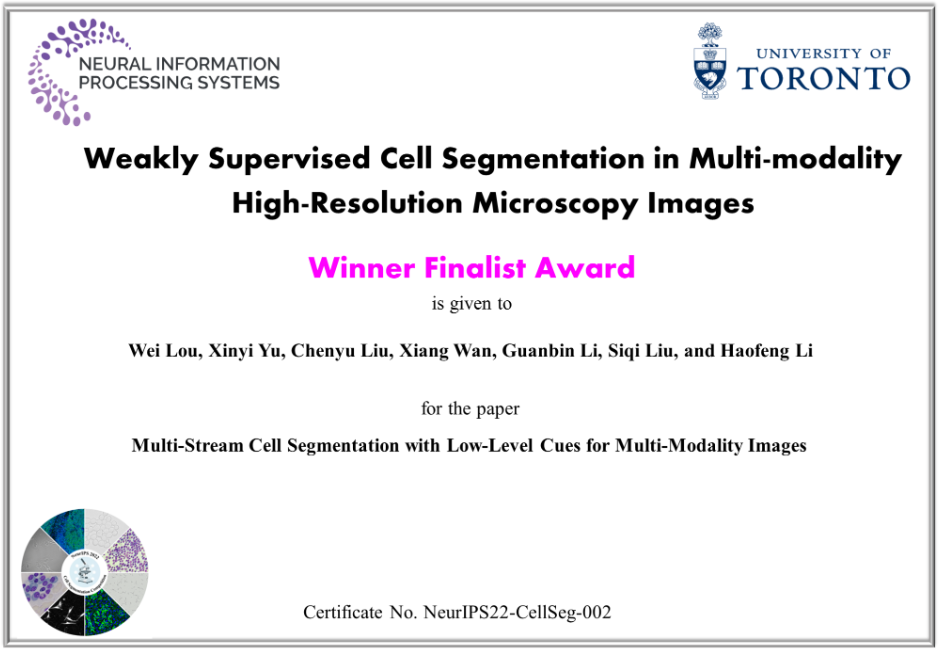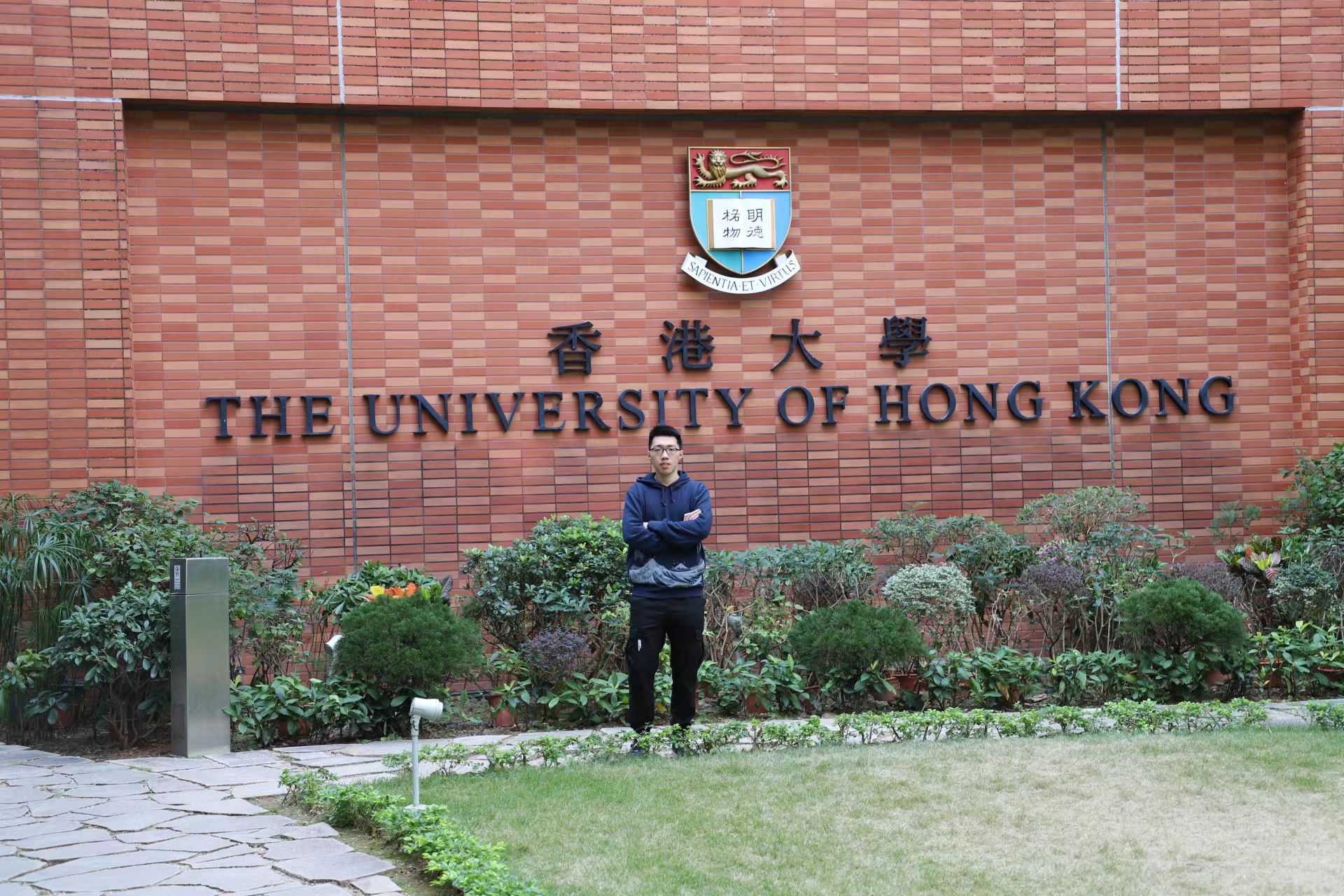Academic Exchange
Dr. Li Haofeng: Striving for Excellence in Medical Imaging and Computer Vision
Dr. Li Haofeng currently serves as a research scientist at the Shenzhen Research Institute of Big Data.He earned his Bachelor of Science degree in Computer Science from Sun Yat-sen University in 2015 and completed his PhD in Computer Science at the University of Hong Kong in 2020. His research focuses on medical image analysis, MRI analysis, histopathology image analysis, and computer vision, with over 20 papers published in prominent national journals and conferences, including IEEE TMI, MedIA, MICCAI, ICCV, AAAI, and others. Dr. Li is also a reviewer for top-tier journals and conferences such as IEEE TPAMI, IEEE TIP, and MICCAI 2023, and he is a member of several professional organizations, including the IEEE and the Chinese Computer Society. Recognized as a high-level overseas talent in Shenzhen, he has been included in the Shenzhen Longying Talent Program. Currently, he leads two major projects funded by the National Natural Science Foundation of China and the Guangdong Basic and Applied Basic Research Foundation. In December 2022, his team won second place in the NeurIPS Global Cell Segmentation Challenge, competing against over 100 teams. This year, Dr. Li was the corresponding author and co-first author on four papers accepted at the MICCAI 2023 conference and one paper accepted at ICCV 2023.

Dr. Li’s journey began with a question: "How can image processing and computer vision better meet the demands of the industry and truly become useful?" During his undergraduate studies, he followed a typical academic trajectory, consistently learning new knowledge and achieving good results, all while aiming for the heights of his field. It wasn't until he entered the PhD stage that he began to explore the intersection of medical image analysis and computer science. During this period, he identified a significant gap between societal needs and the maturity of modern technology. “As the population ages and medical resources become increasingly strained, the scarcity of highly qualified physicians means that using technology to solve medical issues is not only a pressing need for the industry but also a viable opportunity for real-world application,” he explains. Dr. Li successfully addressed the challenges posed by the increased computational load resulting from his shift in focus, adapting to technological changes related to data formats as he transitioned from natural images to medical images. Reflecting on his academic journey, he acknowledges the significant growth he experienced: "The PhD process inevitably involves challenges, and beyond technical issues, you must also navigate the dynamics of collaboration and negotiation with your supervisor. This is an essential part of the process that yields various rewards."

While studying in Hong Kong, Dr. Li enjoyed hiking in the nearby countryside park. "I could hike up to Victoria Peak right after leaving the lab," he recalls. This activity was also part of his preparation for a 100-kilometer hike along the MacLehose Trail, which includes various terrains. After thorough research and training to build his endurance, he set out with friends, successfully reaching the 100-kilometer marker after three days of hiking.
"This is somewhat analogous to conducting research. I strive to push the limits and achieve excellence, which drives me to conduct thorough pre-project research and risk assessments to pursue perfection. Overcoming challenges is quite engaging and brings a sense of accomplishment," Dr. Li shares. With a results-oriented and deadline-focused approach, he currently dedicates most of his time to work, often blurring the lines between life and research. "Many researchers only take breaks after project deadlines, and it's difficult to completely separate research from life. Sometimes, thoughts about research emerge during my free time."

In 2020, after completing his PhD, Dr. Li joined the Shenzhen Research Institute of Big Data with the hope of aligning his career more closely with research. "The institute provides excellent research conditions and resources. The focus of the medical big data laboratory aligns perfectly with my original research motivations, emphasizing practical application scenarios. Additionally, our joint training project with The Chinese University of Hong Kong, Shenzhen, is producing quality student talent, which greatly supports the development of my team." He believes that applied research is solid work and that the research problems themselves must hold application value. Currently, he is engaged in research on digital pathology image analysis and the three-dimensional analysis and processing of MRI data, which aims to assist doctors in diagnostic tasks. For instance, MRI produces three-dimensional images that can consist of over 200 layers, and physicians must review each two-dimensional slice individually, resulting in a significant workload. To quantify the volume of certain lesions, manual delineation using software is necessary, which can lead to errors due to the large volume of images. To mitigate this, Dr. Li's team has developed an automated analysis platform that streamlines some preliminary tasks in the diagnostic process, such as automatically locating lesion areas in the brain and calculating the volumes of these regions, thereby reducing physicians' workloads and minimizing oversights.
Driven by his pursuit of excellence in research, Dr. Li is dedicated to exploring the intersection of medicine and modern technology. He believes that technology can bring new opportunities for healthcare development and continues to innovate in the field of intelligent medical technology.




